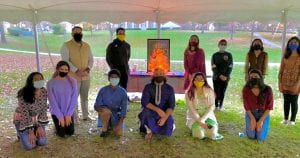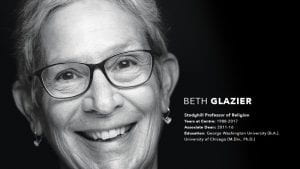Below: Students from the South Asian Student Association gather for Diwali puja followed by virtual holiday meal November 14, 2020

Here’s some background on DIWALI, The Festival of Lights
The five-day festival of Diwali, or “The Festival of Lights,” is one of the most important festivals of the year for Hindus. It is also celebrated by Jains and Sikhs. This year, Diwali itself is celebrated on November 14 in the south of India and November 15 in the north. This week’s celebration of light is preceded by two days of preparatory celebration and will be followed by two additional festival days.
Observed by over a billion people around the world, Diwali is an official holiday in India and ten other countries. The celebration highlights many of the great stories of Hindu tradition, principally the victorious return of Prince Rama and his wife Sita from exile and triumph over their adversaries. Traditional celebrations in Hindu homes include the lighting of oil-filled lamps or candles that welcome Rama and Sita and celebrate the triumph of good over evil. Depending on region and tradition, the holiday also symbolizes stories that celebrate the harvest and welcome prosperity. Worshippers honor Lakshmi, the Goddess of prosperity, and Ganesh, the God of auspicious beginnings. Celebrants also comm emorate the return of the Pandavas (in the Mahabharata Epic) and the triumph over evil, represented by various stories of victory over demons like Narakasura. Related rituals include bathing before sunrise, donning new clothes, worshipping at Temple, and setting off fireworks. The festivities include eating with family, sharing sweets with friends, and decorating homes and workplaces with candles, clay lamps, paper lanterns, or strings of lights.
emorate the return of the Pandavas (in the Mahabharata Epic) and the triumph over evil, represented by various stories of victory over demons like Narakasura. Related rituals include bathing before sunrise, donning new clothes, worshipping at Temple, and setting off fireworks. The festivities include eating with family, sharing sweets with friends, and decorating homes and workplaces with candles, clay lamps, paper lanterns, or strings of lights.
For Jains, Diwali celebrates the day Mahavira attained enlightenment and became a Tirthankara — a “ford-maker,” one who establishes a way to gain liberation. Mahavira established the dharma practiced by Jains worldwide. Jains, and others in business professions, retire old account books and open new ones on Diwali, an act understood as thoroughly religious as well as commercial.
For Sikhs, Diwali celebrates the triumph of Sikh Gurus over captors intent on restricting their freedom to practice, but many celebratory practices are the same.
While the stories related to Diwali vary from region to region and tradition to tradition, its joyous focus is the triumph of light over darkness, and good over evil.
On campus, students from these traditions celebrated with a virtual Indian dinner and an outdoor puja—a worship ceremony presenting light, incense, flowers, prayers, and other offerings to the divine.



